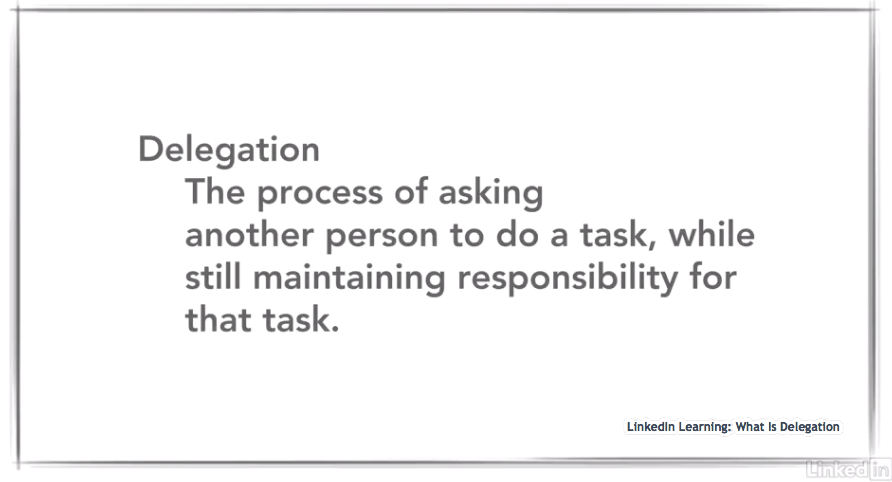While it gets a bad rap on TV, exponentially more leaders struggle with how to delegate than use recklessly. It's a foundational tool for effective leaders. While it creates capacity and freedom for you. More importantly, it enables and develops your team. No time like the present to conquer and reap the benefits.
Knowing how to delegate is fundamental to your growth as a confident leader and sound operator in your organization. Your ability to delegate impacts the people around you, your business and your personal and professional success.
Delegation done right creates possibilities and builds trust. Ignored as a responsibility or done poorly it undermines your leadership and team effectiveness and morale.
It so often gets a bad rap.
It’s fodder for the TV spoofs about office and cubicle life. I’ve witnessed far fewer who abuse than those who under leverage.
Knowing how to delegate lies at the intersection of people management and project management. Knowing a few basic principles and a terrific return on investment from the effort will help and inspire you to manage the intersection.
Precisely What Are We Talking About
Being crystal clear on the definition of delegation is crucial as we look at what you can and can’t delegate and how to do it well.
This nails it:

Delegation is about asking someone, typically who works for you, to do some of your work. Sounds worse than it is. It is not offloading for offloading’s sake.
What Can You Delegate
As with much of management, there is no user manual or checklist for what to delegate or keep. It’s easy to delegate things you don’t care about. People can decipher that. Knowing how to delegate effectively means you also include things that are important to you.
Work volume and time constraints influence what and when things get delegated. While that’s natural on some level, the intent is to give away as much as you can with an eye toward what will accelerate learnings for your team. These learnings will translate to experience, experience to confidence.
It will feel uncomfortable, that’s ok. Who would you delegate to and how would you do it if you weren’t available next week or next month? If you have potential answers to these questions, you ready to start delegating. If you don’t, you need to deal why.
Is there some work and authority you can’t delegate? Sure, you have to assess and balance the complexity of the work, the decisions, risks and the player card available to you.
There is a finesse here. It’s not an all or nothing. You can increase the intensity of the work you delegate as you assign and see positive responses. Rinse repeat with increased complexity.

Click here for the printable infographic
Why Is It So Important – Let’s Spell It Out
So, let’s spell it out -responsibly delegating has the following impacts:
D
Develops skills and confidence of others
Working on new projects at your request help build skills and confidence. Growth comes from pushing into the uncomfortable. And most people learn best by doing.
E
Engage people, and you build trust
There is no better way to “tell” people you trust them than asking them to do work you view as important.
L
Lead by the example — good leaders delegate
For the managers you manage and broadly speaking, your actions (and implied trust) provide a compelling visual and expectation about how to delegate.
E
Empower teams to improve the process and deliver outcomes
Teams given authority to do meaningful work will surprise and delight. This is one of the fantastic payoffs you get as trust builds.
G
Gives the spotlight away for others
As you delegate, you provide opportunities for visibility and recognition. Few employees are over acknowledged or recognized.
A
Accountability and ownership for success increase
When you ask people to complete tasks or projects that are essential, they attach to the outcomes. Increased ownership leads to higher engagement. Higher engagement translates to higher quality output.
T
Teachable and coaching moments
Those you delegate to will encounter teachable moments. New work and experiences mean never seen challenges. As the delegator, you, in turn, will find yourself with coaching moments. All of this supports a healthy environment for personal and professional growth.
E
Click to get the printable infographic
Enables potential successors to move up/in
Great leaders work to replace themselves. If you can’t efficiently delegate, it becomes nearly impossible to grow and advance. If you don’t elevate, your role is not one people can aspire to, grow into and earn.
Plus you never get to go home or on vacation if you are the only one who can do the work! There are no hero medals for putting it all on your back. Eventually, it breaks.
Everyone and I mean everyone is replaceable. Intellectually people accept but forget to translate into action. Here is your chance.

Why Is It So Hard To Delegate
One of the common areas for improvement many leaders cite is the need to delegate more. Unfortunately, the self-awareness is often the end of it. It’s only helpful if you push past it.
In his blog post Delegation Is The Decision To Replace Yourself top leadership consultant Dan Rockwell included 7 reasons you don’t delegate
- Others might outshine you. Insecurity is a bottleneck to delegation
- You’re a control freak who struggles to trust people.
- Others aren’t equipped. They haven’t been trained.
- Mission and vision are ambiguous. People don’t know where they’re going.
- You overestimate your own importance.
- You’re protecting people from discomfort and stress. Coddlers end up overworked and underappreciated.
- The last time you delegated to someone, it was a fiasco.
Some of these are about you. Others are about the perception or reality of people you might delegate.
Face your reasons be they above or beyond.

If You Want To Lead You Need You Need To Know How To Delegate
Let’s focus on the how. As with so much of leading and managing the how is vital. There is some art involved. As a guiding principle, focus on how delegation serves your people rather than how it helps you.
Let’s break it down — before, during and after.
Before
Giving people discrete tasks versus a vision is grating for people. Peel off an entire project or as significant a component as you see appropriate. Guide them to what needs doing but don’t tell them how not to do. People will surprise you. Let them!
During
Delegating and then micromanaging is potentially worse than not delegating at all. Micromanaging midstream is counterproductive and demoralizing. If you don’t trust them, don’t do it.
If you see someone doing something that is dangerous figuratively or literally, certainly intercede without demoralizing or taking over. Think teachable moments small or large.
After
Learning occurs when you assign out part of your job. Your coaching should focus on asking open-ended questions and getting them to talk you through, self-assess and reveal learnings.
Your personal brand work should include a gut check on how people see you regarding delegation.

Don’t Be A Dumper
I’ve only worked with a few people who practiced delegation in an overly aggressive manner. There is a line you can cross – where delegation resembles dumping the work and abdicating responsibility.
It’s more feel than anything else, but a lack of interest and acknowledgment are the signs it slipping in the wrong direction.
Delegation doesn’t mean people don’t feel supported. Quite the contrary. You are around, encouraging and eager to see results.
And if people make wisecracks about it, I guarantee there is some truth to their comments. Take it to heart and retool.
Make It The Meaningful & Results Follow
Grab the reins and show your team and your business you know how to delegate.
Get past “I need to delegate more” to an intentional approach to developing your people, building your business and showing confident, trusting leadership.
The more critical and challenging the assignments, the more you all grow and advance.
Question: What gets in the way of you delegating? Why?

